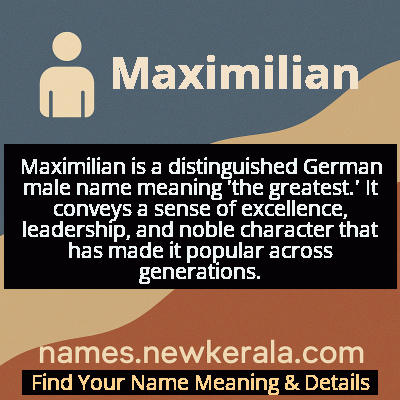Maximilian Name Meaning & Details
Origin, Popularity, Numerology Analysis & Name Meaning of Maximilian
Discover the origin, meaning, and cultural significance of the name MAXIMILIAN. Delve into its historical roots and explore the lasting impact it has had on communities and traditions.
Name
Maximilian
Gender
Male
Origin
German
Lucky Number
6
Meaning of the Name - Maximilian
Maximilian is a distinguished German male name meaning 'the greatest.' It conveys a sense of excellence, leadership, and noble character that has made it popular across generations.
Maximilian - Complete Numerology Analysis
Your Numerology Number
Based on Pythagorean Numerology System
Ruling Planet
Venus
Positive Nature
Harmonious, responsible, caring, and artistic.
Negative Traits
Overly idealistic, superficial, possessive, or jealous.
Lucky Colours
Pink, turquoise.
Lucky Days
Friday.
Lucky Stones
Diamond, turquoise.
Harmony Numbers
2, 3, 9.
Best Suited Professions
Artists, musicians, teachers, healthcare workers.
What People Like About You
Warmth, nurturing nature, artistic flair.
Famous People Named Maximilian
Maximilian I
Holy Roman Emperor
Expanded Habsburg territories through strategic marriages and established the dynasty's European dominance
Maximilian Schell
Actor and Director
Academy Award-winning Austrian-Swiss actor known for 'Judgment at Nuremberg' and extensive film career
Maximilian Kolbe
Catholic Priest and Saint
Martyr who voluntarily took the place of a stranger in Auschwitz concentration camp, canonized as a saint
Maximilian von Spee
Naval Commander
German admiral known for his command during the Battle of Coronel and Battle of the Falkland Islands in WWI
Name Variations & International Equivalents
Click on blue names to explore their detailed meanings. Gray names with will be available soon.
Cultural & Historical Significance
The name's cultural impact extends beyond aristocracy into religious and modern contexts. Saint Maximilian Kolbe's heroic martyrdom during WWII infused the name with spiritual significance, making it popular among Catholic families seeking both noble and religious associations. In contemporary culture, Maximilian maintains its sophisticated, international appeal while adapting to modern naming trends through the accessible nickname 'Max.' This dual identity allows the name to bridge historical gravitas with contemporary familiarity, ensuring its enduring popularity across German-speaking countries and beyond.
Extended Personality Analysis
Individuals named Maximilian are typically perceived as confident, ambitious, and naturally authoritative, reflecting the name's imperial heritage and meaning of 'the greatest.' They often exhibit strong leadership qualities, strategic thinking abilities, and a dignified presence that commands respect in both professional and social environments. Many Maximilians demonstrate intellectual curiosity, cultural sophistication, and a tendency toward perfectionism, frequently excelling in fields that require precision, vision, and careful planning. Their inherent sense of responsibility and high personal standards can make them demanding of themselves and others.
Despite their formal exterior, Maximilians typically show deep loyalty to family and close friends, combining traditional values with modern adaptability. They often serve as protective figures in their relationships, offering stability and guidance to those they care about. While sometimes appearing reserved or overly serious initially, they usually reveal warmth, generosity, and a dry wit to those who know them well. Their combination of intellectual rigor and emotional depth makes them effective in leadership roles while maintaining meaningful personal connections, embodying the balance between achievement and relationship-building that the name historically represents.
Modern Usage & Popularity
Maximilian has experienced a remarkable resurgence in popularity since the late 20th century, particularly in German-speaking countries where it consistently ranks among the top 100 male names. The name has gained significant traction internationally, appearing with increasing frequency in the United States, United Kingdom, and other English-speaking nations. Its contemporary appeal lies in the perfect balance between classical elegance and modern accessibility through the nickname 'Max,' allowing parents to choose a name with historical gravitas that doesn't feel overly formal in everyday use. The name's sophisticated, international feel appeals to cosmopolitan families, while its strong European roots and positive associations with intelligence, leadership, and reliability continue to make it an attractive choice for parents seeking a name that will serve their child well throughout life.
Symbolic & Spiritual Meanings
Symbolically, Maximilian represents the pursuit of excellence, the exercise of authority, and the creation of enduring legacy, embodying the fundamental human aspiration toward achieving the highest potential in all endeavors. The name carries deep connotations of imperial power, aristocratic bearing, and historical significance, suggesting an individual destined for leadership roles and meaningful impact on their community or field. Metaphorically, it symbolizes the bridge between ancient tradition and modern innovation, combining Roman roots with contemporary adaptability. In psychological terms, the name suggests a person who values structure, honor, and substantial accomplishment, often associated with protective strength, intellectual mastery, and moral integrity. The symbolic weight of 'the greatest' inspires expectations of exceptional performance while also encouraging the development of character and principle in equal measure to achievement.

